A Level Subjects
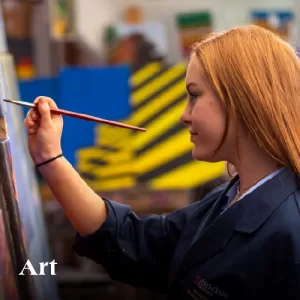 Art
Art Art and Design (AQA Fine Art 7202)
We are seeing the aims of the department bear fruit with a generation of artists emerging who are producing a tremendous range of exciting and highly skilled work.
There is also a culture of art appreciation and debate growing within the school. Other departments are responding to this and several joint ventures have been undertaken. Many pupils now choose art related subjects to study at university including Fine Art, Architecture, History of Art, Graphics, Theatre Design etc.
We have also enjoyed a great deal of success in the public exams, with a high percentage of students getting top grades at GCSE and A level.
Course Overview
It is anticipated that those studying Art at A level should have a higher level of motivation, and a keen interest in the work of other artists and designers. The ability to handle and manipulate materials in a confident and fluent manner is essential.
For those wishing to embark on a career as an artist, designer or architect A level Art would be a necessary choice. However imagine the would-be medic asked to discuss a current Science and Art exhibition at their Oxford interview and feeling glad that they had taken Art as their fourth option. Imagine the prospective engineer who was told at their Cambridge interview that it was a real bonus that they were able to draw, and you will begin to see how Art is useful in all kinds of spheres – the dentist who is a skilled craftsman and can match different shades of white is obviously at an advantage.
Think of your favourite film, remember that the director and those employed in its making probably found their way into cinema via Art school.
Lower Sixth Art
Component 1:
A portfolio unit of course work. A portfolio of materials which exemplify work carried out at AS. Work marked as a whole.
Component 2:
Internally set assignment- a project with a five hour supervised time incorporated into the preparation for a final outcome. Work marked as a whole.
Upper Sixth Art
Component 1: Personal investigation-(Internally assessed and externally moderated 60% of A2)
This is based on an idea, issue, concept or theme supported by 1000-3000 written piece of work.
Component 2: Externally set assignment- (Internally assessed and externally moderated 40% of A2)
This is a project based on one of eight starting points set by AQA. Students produce a clearly defined selection of work which will lead to a finished piece or pieces.
Links to other subjects
A common combination of A2 courses is Art, Maths and Physics or Art, Geography and Physics.
Links to HE courses and beyond
Many of our students go on to do Art related degrees such as Architecture and Landscape Architecture whilst others will go on to study Art on a foundation course either locally or attached to a degree course elsewhere within the UK.
Recent department trips include:
Chatsworth– meeting the artists Michael Craig-Martin and Jenny Saville.
London– meeting advertising Creative Director Alan Mackie and fine artist Brian Griffiths and tutor at the Royal Academy. Visiting major galleries in London.
Manchester– competing in the regional heats for the Articulation competition.
New York and Washington DC– visiting major international galleries in both cities.
 Business & Economics
Business & Economics Business and Economics
The main aim of the Department of Business and Economics is to maximise the wide educational benefit to be gained from a knowledge and appreciation of the two subjects. A knowledge of Economics and/or Business aids the understanding of the environment in which organisations operate, including the natural, social, political and economic environment.
Economics, Management and Business courses continue to be popular amongst Birkdale leavers and an A level in either Economics or Business constitutes excellent preparation for such courses. Indeed, even if students are not expecting to read these subjects at university most will become managers of some sort in their own professional environment.
The department is very active on the extra-curricular front. Birkdale School is a Young Enterprise Centre of Excellence and we are successful in a range of local and national competitions, including the Bank of England’s Target 2.0 competition and the ICAEW’s BASE competition. In addition, the department produces its own in-house magazine, the Sleeping Dragon.
The department organises a variety of day and residential visits, including an annual trip to London visiting the Bank of England, Downing Street and the Houses of Parliament. A three-yearly trip to China and Hong Kong is also offered, in conjunction with the Modern Foreign Languages Department.
A Level Business and Economics
Economics (AQA 7136)
Economics is a real-world subject that affects everyone! It is about our economic system and how it operates. Inevitably, it is also about problems such as unemployment, rising house prices, taxes and recent events.
You will investigate micro and macroeconomics. Microeconomics addresses issues such as: ‘Why are house prices so high in some areas?’, ‘Can pollution be controlled effectively?’ and ‘Should governments interfere with markets?’. The macroeconomic issues covered include: ‘Why does the government have a target and how does it affect us?’, ‘What happens to the economy if people decide to spend more?’ and ‘How are we affected by the Chinese and Indian economies?’.
The A level course comprises three papers:
Paper 1: Markets and market failure (Written exam: 2hrs, 33.3% of A level)
Economic methodology and the economic problem; individual economic decision making; price determination in a competitive market; production, costs and revenue; perfect competition, imperfectly competitive markets and monopoly; the labour market; the distribution of income and wealth – poverty and inequality; the market mechanism, market failure and government intervention in markets.
Paper 2: The national and international economy (Written exam: 2hrs, 33.3% of A level)
The measurement of macroeconomic performance; how the economy works – the circular flow of income, AD/AS analysis and related concepts; economic performance; financial markets and monetary policy; fiscal policy and supply-side policies; the international economy.
Paper 3: Economic principles and issues (Written exam: 2hrs, 33.3% of A level)
A multiple choice question and case-study paper, based on the content already covered in Papers 1 and 2.
Links to other subjects
Economics is closely related to Business and has particular links to Mathematics, Government & Politics, Psychology, Geography and Modern Foreign Languages.
Links to HE courses and beyond
An A level in Economics would be considered valuable preparation for degree level study in the fields of Economics, Econometrics, PPE, Business Management, Accountancy and Finance, Marketing and Quantity Surveying. In addition, it provides a solid foundation for careers in banking, investment management and corporate law.
Business (AQA 7132)
The Business course focuses on the objectives and different functions of business, e.g. marketing, accounting and finance, operations and human resources, along with the challenges facing business from the wider competitive environment. Those who study Business will inevitably meet some areas of Economics because all businesses are affected by what happens in our economy.
You will be introduced to the challenges and issues of starting a business, including financial planning. The key internal functions of businesses are then explored along with how the management of these functions can assist in improving the effectiveness and performance of a business. Finally, you will examine business strategy and how businesses might best respond to change in today’s fast moving commercial environment, both domestically and internationally.
The A level course comprises three papers:
Paper 1: Business 1 (Written exam: 2hrs, 33.3% of A level)
What is business?; managers, leadership and decision making; decision making to improve marketing performance; decision making to improve operational performance; decision making to improve financial performance; decision making to improve human resource performance; analysing the strategic position of a business; choosing strategic direction; strategic methods – how to pursue strategies; managing strategic change.
Paper 2: Business 2 (Written exam: 2hrs, 33.3% of A level)
A data response paper, based on the content already covered in Paper 1.
Paper 3: Business 3 (Written exam: 2hrs, 33.3% of A level)
A case-study and essay paper, based on the content already covered in Papers 1 and 2.
Links to other subjects
Business is closely related to Economics and has particular links to Mathematics, Psychology, Geography and Design & Technology.
Links to HE courses and beyond
An A level in Business would be considered valuable preparation for degree level study in the fields of Business Management, Accountancy and Finance, Marketing, Corporate Law, Economics and Quantity Surveying, whilst providing a solid foundation for any student looking to run their own, or somebody else’s, business.
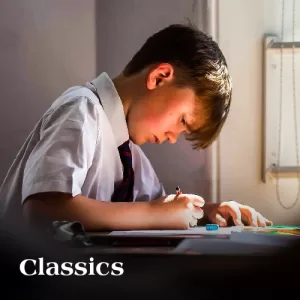 Classics
Classics A Level Classics
Classical Civilisation A Level (OCR H408)
The course is open to everyone. You do not need to have studied any Classics before. The main requirement is an open mind!
Are you curious about the ancient cultures of Greece and Rome and their impact on the world we live in today?
Classical Civilisation will give you an appreciation and understanding of them and reveal the effect they still have on humanity.
Both Greece and Rome are studied.
There are three components for study and examination.
1 The world of the hero
This involves an in depth study of one of Homer’s Iliad or Odyssey and Virgil’s Aeneid
All literature is read in translation.
2 Culture and the arts
A study of Greek theatre.
3 Beliefs and Ideas
Greek Religion
Components 2 and 3 involve study of visual and material culture as well as literature in translation.
Latin A Level (OCR H433)
The challenge of A Level Latin develops naturally from the skills developed at GCSE.
There are three components:
1 Language
This is assessed by unseen translation and a comprehension paper.
2 Prose Literature
3 Verse Literature
For the literature, two texts for each component are studied during the course. The literature covers a range of authors from the magnificent epic of Virgil to the witty love poems of Ovid or forensic speeches of Cicero to the dark politics of Tacitus’ history.
As the course involves both linguistic skills and appreciation of literature, it is a useful contrast to more technical or scientific subjects. It can also enrich the study of other humanities subjects such as English, History, Religious Studies and Modern Languages.
Latin is a highly regarded subject by universities and employers, especially for degree courses in Law, History, English and Modern Languages.
Classical Greek AS Level (OCR H040)
If you enjoyed GCSE Greek and are keen to build on the skills you have already acquired, you should find this a rewarding challenge.
The course is examined by two modules
1 Language
This component builds on the knowledge skills and vocabulary developed at GCSE and is assessed by a translation and comprehension paper.
2 Literature
This involves detailed study of one prose and one verse author during the course
This AS course is unusual for Birkdale in that it is taught over TWO years, with four periods in the Lower Sixth and four in the Upper Sixth. Both modules are examined at the end of the Upper Sixth.
This course provides an ‘extra’ AS level subject and is studied alongside your three choices from the option blocks.
Employer surveys show that Classics graduates are successfully entering many different industries, particularly IT and the financial sector.
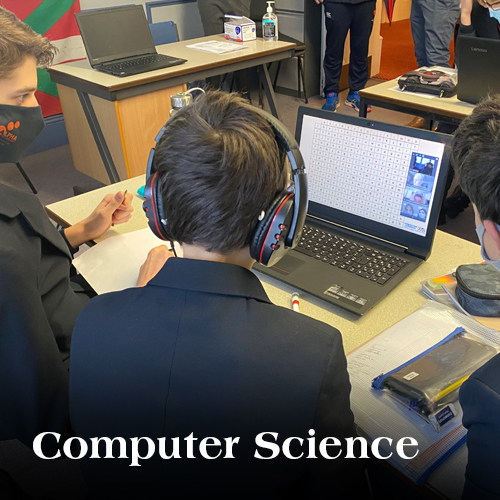 Computer Science
Computer Science A Level Computer Science
Computer Science (OCR H446)
Computer Science is not the same as ICT! At the heart of Computer Science is the development of computational thinking, helping learners to develop the skills to solve problems, design systems and understand the power and limits of human and machine intelligence. The subject is practical – learners will apply classroom learning to real-world systems and write and test significant amounts of code. The subject is creative – learners will blend ideas and methods to create inventive solutions to problems. The subject is academic – learners must apply high level powers of analysis, evaluation and decision-making to produce elegant and accurate results. Throughout this course there will be an emphasis on problem solving using computers, computer programming and algorithms, and the mathematical skills such as Boolean algebra used to express computational laws and processes.
A Level lessons are delivered using practical, hands-on methods where possible. Programming is not taught in isolation – it is applied to produce solutions that illuminate and clarify other aspects of theory relevant to the course. Students will be exposed to several programming paradigms and languages – they will also be encouraged to explore additional options through self-study. No prior experience of Computing is required, although we would expect students to have achieved at least a grade B in Mathematics at GCSE level. However, a passion for computing is much more important and we would be delighted to consider any student who is fascinated by computer technology and is willing to work hard and try their very best.
A Level Computer Science
Paper 1: Computer Systems (Written paper 2 ½ hours – 40% of A Level)
This component contains the majority of the content of the qualification and is assessed in a written paper recalling knowledge and understanding.
Topics of Study include: Components of a computer and their uses; Software and software development; How data is exchanged between different systems; How data is represented and stored within different structures; Different algorithms that can be applied to these structures; The individual (moral), social (ethical) and cultural opportunities and risks of digital technology; Legislation surrounding the use of computers and ethical issues that can or may in the future arise from the use of computers.
Paper 2: Algorithms and Programming (Written paper 2 ½ hours – 40% of A Level)
This component relates principally to problem solving skills needed by learners to apply the knowledge and understanding gained in the first component.
Topics of Study include: Understand what is meant by computational thinking; How computers can be used to solve problems and programs can be written to solve them; The use of algorithms to describe problems and standard algorithms.
Component 3: Programming Project (Non-exam teacher assessment – 20% of A Level)
The project is a substantial piece of work which assesses a variety of different skills including the development and demonstration of computational thought processes. Learners will need to choose, in liaison with their teacher, a well-defined user driven problem. The choice of project must enable learners to: meet all assessment requirements as contained in the specification; use an appropriate programming language which is non-trivial and has a substantial coded element; solve a problem sensibly within the constraints of resources available facilitate the successful completion of a whole task from its definition to its acceptance and evaluation by that user. The project will be submitted in the form of a report that will contain the solution to the chosen task.
Please note: Mathematical skills are embedded throughout the content of the three components. They will be assessed in the written papers and through the non-examined assessment where appropriate.
Links to HE courses and beyond
Computer Science, Software Engineering, Programming, IT, Computer Game Design, Creative Media.
Student views on the course
On completion of Computer Science courses most students look back on a challenging but very rewarding achievement. They feel that the skills they learn will be good preparation for future study and vocational responsibility. Some have maintained an interest in programming and database development, and have found useful applications later on in their careers.
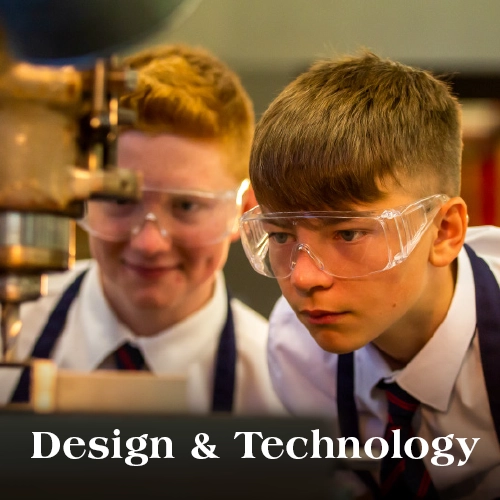 Design & Technology
Design & Technology A Level Design & Technology
A Level Classwork
Design and Technology – Product Design (Resistant Materials pathway)
Design and Technology – Product Design (Graphics pathway)
Design and Technology – Design Engineering (similar to the old Systems and Control qualification)
Coursework is now 50% of the qualification, and 50% examination, reflecting an increased focus on examined content but still enabling students to design, make and evaluate creative products.
Math’s and science content is included within all courses.
| Product Design
Resistant Materials Pathway |
Design & Make coursework activity – 50% | Written Examination – 50% |
| Product Design
Graphics Pathway |
Design & Make coursework activity – 50% | Written Examination – 50% |
| Design Engineering | Design & Make coursework activity – 50% | Written Examination – 50% |
All three Design and Technology courses listed above consist of a common core of study concerned with product design and analysis, plus a substantial amount of time spent studying their chosen specialist area in which they produce a coursework project in the final year. The format of these projects is outlined below. The courses are student-centered with the student very much in-charge of his/her learning. Students will have to be self-motivated and able to work well collaboratively, as well as independently. It is helpful, but not essential, to have followed a Design subject at GCSE, with the exception of Design Engineering where previous experience is usually expected.
Examples of past projects for all three areas are featured on the Design and Technology Portal. It is also worth looking at the ‘Young Engineer for Britain’ link from the ‘Competitions’ link on the same page. The school is regularly commended nationally for the high levels it achieves with both the practical and design folder elements of these courses.
Students will learn how to apply knowledge and understanding of a wide range of materials; including modern and smart materials, and processes used in product design and manufacture.
They will learn how to develop an understanding of contemporary industrial and commercial practices applied to designing and manufacturing products, and to appreciate the risks involved.
Students will be taught a good working knowledge of health and safety procedures and relevant legislation.
Students will be taught the importance of key historic movements and the impact key figures have on modern design thinking and how designers from the past provide inspiration for present and future designing.
It is increasingly important that students develop an awareness of wider issues in design and technology, that design and technological activities can have a profound impact on the environment and on society and that these, together with sustainability, are key features of design and manufacturing practice.
Mathematical and scientific principles are an important part of designing and developing products and students will be expected to apply these principles when considering the designs of others.
Design and Technology ~ Product Design: with a graphics pathway
Project work can be made full size or modelled to an appropriate scale. For instance, an adventure playground or a loft conversion could be designed for a particular client and then modelled in specific materials and to an appropriate scale; typically, the type of models an architect may produce. The course teaches the use of ‘Adobe InDesign 5.5’, ‘Photoshop’ and Solid Edge software, and students use these software packages extensively in the creation of their design folder.
Design and Technology ~ Product Design: with a Resistant Materials pathway
Students gain much satisfaction and a real sense of achievement from this area. They identify a need and then make a fully working prototype utilising a range of appropriate materials within the same project. An example of this type of project is the ‘PortaBar’, which uses aluminum, steel, nylon, ABS and foam. Victoria, who came to us with very little D+T experience, designed and made a portable lightweight ‘ballet bar’. Students gain first-hand experience of a variety of materials and skills from welding to casting, screw cutting to CAM work. There are many more examples of projects to view on the website.
The course teaches the use of ‘Adobe InDesign 5.5’, ‘Photoshop’ and ‘CAD software to produce the design folder, which must accompany their practical work.
Design and Technology ~ Design Engineering
This is focused towards engineered and electronic products and systems; the analysis of these in respect of function, operation, components and materials, in order to understand their application and uses in engineered products/systems that have commercial viability.
The subject content of this component is focused towards electronics and engineered products and systems and their analysis in respect of:
- materials and components, and their selection and uses in products/systems
- wider issues affecting design decisions.
- programmable micro controllers
- mechanisms
- pneumatics
It is essential that materials, components and systems are studied from the perspective of analysing modern engineered products. Learners should gain practical experience of using materials, components and systems and, where possible, the content which follows should be learned through applied practical activities, set within realistic design scenarios.
The aim of the component is to give learners a framework for analysing existing products/systems that enables them to make considered selections of appropriate materials, components, systems and manufacturing processes when designing. Students will design and make a prototype as part of the coursework module, using a range of mechanisms, electronics or computer control to investigate an area within engineering they find interesting.
Learners are also required to demonstrate their mathematical and scientific knowledge and skills in the exam that are applied to design and technology practice. The level of mathematical and scientific knowledge within this qualification should be equivalent to higher tier GCSE (9–1) learning.
For learners in Design Engineering, there is an additional 10% mathematical requirement than the other endorsed titles. This extra 10% covers the specific mathematical skills associated with scientific formulae.
Links to other subjects
All 3 Design and Technology areas have strong links with Physics, Math’s, Art and General Studies, utilising the skills learnt in these four subject areas in everyday design projects. However, D&T is in fact suitable for any student with a keen interest, regardless of other subjects being studied, and students often come from a wide variety of subject backgrounds and expertise.
Links to HE courses and careers
It is one of the very few subject areas that bridges the gap between Science and Arts subjects and, as such, this allows students greater flexibility of choice when entering higher education or the job market. Students having taken D&T at A level have in the past moved on to careers such as architect, civil engineer, mechanical engineer, software engineer, aeronautical engineer, marine engineer, control systems engineer, product designer, airline pilot, armed forces officers, teaching, the police force, and many more fulfilling professions.
 Drama & Theatre
Drama & Theatre A Level Drama and Theatre
This is an A Level which comprises practical work, set plays, the study of theatre practitioners and work on live theatre productions. It requires a willingness to work as part of a team, good communication skills and an ability to think creatively. It is a challenging and demanding discipline both intellectually and artistically. It is an academic subject.
Content and Assessment Overview
Component 1: Devising (40 %) (Internally assessed)
Students devise an original performance piece using one key extract from a performance text and a theatre practitioner as stimuli. They must produce a written portfolio of between 2500-3000 words and the devised performance/ design realisation.
Creating a devised performance, includes:
- exploring an extract from a text in light of a practitioner
- using this exploration to create ideas for a devised piece
- working collaboratively to develop these ideas
- analysing and evaluating the development process and your contribution to it
- analysing and evaluating your performance
- recording this process in a portfolio
Component 2: Text in Performance (20%) (Externally assessed by visiting examiner)
Students present a group performance/ design realisation of one key extract from a performance text and a monologue or duologue performance from a key extract from a different performance text.
Taking part in two extract performances from two different texts, one a monologue or duologue and the other a group piece, includes:
- developing performance and/or design skills
- understanding the context of the extracts within the text
- articulating your intention for the character you are performing or the design you have created
- communicating your intention through performance
Component 3: Theatre Makers in Practice (40%) (Externally assessed)
Students will sit a 2 hour 30 minute exam. This will ask students to evaluate a live theatre performance they have seen, explain how they would realise an extract from a performance text they have studied and produce an extended answer on another performance text they have studied.
Practical exploration of a set text, including:
- understanding of style, genre, structure, form
- interpretation of characters
- consideration of staging, including lighting, set and sound
- consideration of costume and make up
- understanding of social, historical and cultural context
- how meaning is communicated to an audience.
Re-imagining of a set text for a contemporary audience in light of a practitioner, including:
- exploring the work of a practitioner and considering how that would affect their re-imagined production
- interpretation of characters and understanding of style, genre, structure, form
- consideration of staging, including lighting, set and sound and costume
- understanding of social, historical and cultural context
- how meaning is communicated to an audience.
Analysing and evaluating a piece of live theatre, including:
- watching a piece of live theatre
- producing notes to document their response to it.
Links to other subjects:
English Language/Literature, Art, Music, Classics, Design and Technology, History, Religious Education.
Links to HE courses:
Drama, Theatre and Performance, Law, Journalism, Commerce, Social Sciences, Communication/Personnel, Cultural Studies.
 English
English A Level English
English Literature (AQA 7717)
For this course we focus on aspects of crime and tragedy as ‘lenses’ through which texts can be appreciated and understood. There are six set texts in total, including a modern novel and Shakespeare. In class we read and discuss these in detail and students are encouraged to develop their understanding of how authors shape meanings in their texts. Lessons in English Literature are designed to be fun, lively, thought-provoking and challenging.
Time is spent learning about the different contexts in which the texts were produced so we all deepen our awareness of how societies, religious and scientific understanding, politics and philosophy have changed over time. Not only is this really interesting as we discover more about how writers have shaped our understanding of how people engage with their readers and how we engage with what we read, it is also of significant importance in terms of our wider engagement with the world.
Students are encouraged to read widely themselves and have the opportunity, in the non-exam assessment (NEA), to write about a novel and a collection of poetry of their own choice. In class a variety of texts are explored as a starting point to the NEA but the emphasis is very much on students working independently. We also look at various ways of reading texts, exploring how narrative, feminist, Marxist or post-colonial theories (amongst others) can shape the ways in which we understand texts.
The subjects of tragedy and crime will be, no doubt, entertaining, enlightening and moving. There are some great texts to explore. Though in many ways this is not a subject that can simply be ‘learned’ in a traditional sense, the way in which the course develops students’ skills of analysis and perception makes it an excellent subject to study and one that is highly valued by universities. In previous years our students have gone on to study a variety of courses, including English Literature at Oxford University and UCL, and they take with them strong memories of texts they have thoroughly enjoyed studying at A Level.
English Language (AQA 7702)
This A Level offers fresh insight into the daily usage (and abusage) of English Language by individuals and groups; it will challenge your preconceptions of language and human interaction, as well as stimulating your understanding of how language is used and fostering your own ability to communicate effectively – both when speaking and writing. Lessons are designed to be lively and fun, with group discussions, exploration of a variety of ‘real world’ texts, challenging and thought-provoking topics and even some revelations!
Language and representation is an engrossing topic where we look closely at how language is used to present people and institutions in certain ways. One of the great joys of this course is that it will increase your capacity to see clearly how language is used in everyday life to manipulate an audience. Not only that, the course will also facilitate the development of your grammatical and analytical skills, in order that you will increasingly be able to describe language in a very precise and accurate way. You will be presented with a rich and diverse range of provocative texts, ranging from internet chat rooms, vlogs and social media, to transcripts of spoken conversations and more traditional written texts, such as newspaper articles, letters and magazines.
You will also explore language in its wider social and geographical contexts – in particular the rich variety of English within the British Isles and indeed the wider world. The exploration of the ways in which social status, occupation, and gender affect language use is another absorbing facet of English Language, and you will be encouraged to develop an objective and evaluative perspective as the course develops.
The non-exam assessment (NEA) allows you to choose your own area of research for an extended language investigation. This project is not only interesting in its own right but also provides invaluable experience of the independent study skills that are highly valued on a degree course. You will also produce a piece of creative writing which forms a pleasing contrast to the essay writing skills required for most other A Level courses. As this is a subject that builds essential skills in communication and understanding, it will dovetail neatly with any other A Level course you may wish to study. It is also accepted by universities as a relevant qualification for a wide variety of courses. In short: it’s an original, extremely accessible and vibrant A level course.
 Geography
Geography A Level Geography
Geography (Edexcel 9GE01)
In the A Level specification, there are four areas of study: Dynamic Landscapes, Dynamic Places, Physical Systems and Sustainability, Human Systems and Geopolitics.
Paper 1 – Dynamic Landscapes, Physical Systems and Sustainability (30% of A Level)
Tectonic Processes and Hazards: Why some locations are at risk of tectonic hazards, the causes of tectonic hazards, why some tectonic hazards turn into disasters and the success of management of tectonic hazards.
Landscape Systems: An in depth understanding of the physical processes of Coastal Landscapes.
Water Cycle and Water Insecurity. The factors controlling the cycling of water. The natural and human factors that lead to a surplus and deficit of water and the role of climate change. The issue of water insecurity, its consequences and strategies for managing this issue.
Carbon Cycle and Energy Insecurity: The physical processes that control the cycling of carbon. The natural and human factors that lead to changes in stores of carbon. The consequences of our reliance on fossil fuels. How the carbon and water cycles are linked to the global climate system.
Superpowers: What are superpowers and how have they changed over time? What are the impacts of superpowers on the global economy, political systems and the environment? How is the influence and power of superpowers changing?
Paper 2 – Dynamic Places, Human Systems and Geopolitics (30% of A Level)
Globalisation: The causes of Globalisation, why it has accelerated and the impacts of Globalisation.
Regenerating Places: Students begin by studying the place in which they live (Sheffield) in order to look at economic change and social inequalities. They will then put this in context in order to understand how regional, national, international and global influences have led to changes in Sheffield. The topic explores why regeneration is needed, how regeneration is managed and how successful is regeneration.
Global Development and Connections: Aspects of world development issues are studied.
Migration, Identity and Sovereignty: The impacts of Globalisation on international migration. The development of nation states and how they have involved including the impact of Globalisation. What impact has global organisations such as the World Bank and IMF had on global systems such as Trade and Migration. The threats to national security in a more Globalised world.
Paper 3 – Synoptic Investigation of a geographical issue (20% of A Level)
Coursework – Independent Investigation (20% of A Level)
This will be an internally assessed and externally moderated written report of 4000 words.
Fieldwork: For the A level there are 5 days of compulsory fieldwork. Part of your fieldwork will go towards producing the Independent Investigation. The fieldwork will take place in the summer term of the L6 in Dorset.
There are clear links with Economics/Business Studies, Politics and Maths. Students will find this course stimulating, challenging, interesting and relevant, with many areas of study for both the physical and human components being drawn from recent events or issues. Students learn that Geography is indeed relevant to their everyday lives
 History
History A Level History
Component 1 Breadth Study
The making of a Superpower: United States of America 1865 to 1975
40% of the A level assessed at the end of the course by a 2 ½ hour exam.
Component 2 Depth Study
Religious conflict and the Church in England 1529 – 1570.
40% of the A Level assessed at the end of the course by a 2 ½ hour exam.
Component 3 Historical Investigation
Tsardom and Communism: Russia 1855 to 1953
20% of the A Level assessed during the course by a 3,500 word coursework essay.
There are university lecture days and there is an active History Society. The Department also hosts the Sheffield Branch of the Historical Association.
 Maths
Maths A Level Maths
A Level Mathematics builds upon GCSE work and a grade 7 or above is preferred for this course (8 for Further Maths). Students will develop a “mathematical tool kit” for solving problems and will need to follow step by step arguments, work hard and also realise that, unlike at GCSE, there will be questions which cannot be answered straight away. However, it is that challenge and the ultimate sense of achievement when a problem is solved which makes Mathematics such a rewarding and exciting subject at Advanced Level.
We follow the Edexcel Mathematics specification. The course will be assessed via three terminal two hour papers; two will cover the Pure Maths and one will examine Statistics and Mechanics.
Those who have a real passion for Maths can opt to study Further Mathematics as well as the standard Mathematics A Level. This course will be taught in parallel with the regular A level Maths course, taking into account any necessary prerequisite knowledge.
We are extremely proud of the results achieved by our pupils. It is also noteworthy how many pupils go on to take up university offers at top institutions which require grades in Maths, Further Maths or both.
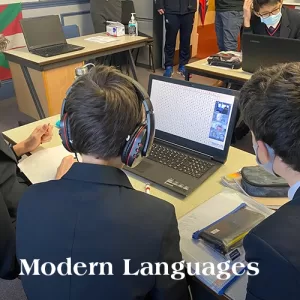 Modern Languages
Modern Languages A Level Modern Languages
The languages that we offer are at A level are French, German and Spanish. The work builds on the foundations established at GCSE, in which the student should normally have achieved an A or an A* grade in the language. An A Level in a modern language will enable the student to speak and write the language with confidence as well as understand more advanced written and spoken language across a variety of situations. It will also provide the student with practical and transferable skills as well as broadening their cultural horizons; the courses are enjoyable and interesting in addition to being academically rigorous. Moreover, in the jobs market, advanced linguistic skills are valued by many employers.
Subject content and assessment
The A Level courses cover a range of linguistic, literary and cultural topics. Themes such as the family and popular culture are studied in Year 12, extending skills developed at GCSE in listening, speaking, reading and writing. In Year 13, the themes move away from GCSE and are more focused upon the country whose language they are studying, such as immigration and integration. At A Level, either one film and one book, or two books are studied. In addition, A Level students undertake an individual research project on something which has been of interest to them in the A Level course. Although the study of literature may at first appear a little daunting, the experienced staff team choose the texts or film with a view to their accessibility and with students’ interests in mind. Grammatical work is important at A Level, as the only way to become a truly competent user of a language is to understand its grammar and to be able to apply it in any situation; grammatical work is not overbearing, however – it is taught in a thorough but regular and manageable way.
There are three examinations at the end of the course. One of these is a speaking test, which is conducted by either one of the class teachers or an external examiner before study leave, leaving only two further papers to sit. One examination tests listening, reading and writing skills as well as grammatical knowledge. Unlike GCSE, the listening material is provided on CD for the student to listen to as many times as they like. The second examination paper provides an opportunity to write about the book(s) and/or film which have been studied.
Course books and resources
All the languages taught in the Department use a variety of materials, such as newspapers and magazines, film and video, and ICT as well as an exam-board specific course book. Students have a weekly timetabled lesson with one of our native speaker language assistants, either in a small group or individually in order to develop oral confidence and fluency.
Trips and Competitions
We strongly encourage sixth form linguists to participate in home-stay visits, study trips or undertake work experience to France, Germany or Spain. As a general rule, and where numbers are sufficient to make a trip viable, there will be opportunities offered for all three languages at some point in the two years of the course. Time spent abroad, living and breathing the language and culture of the country, is a highly desirable and extremely valuable part of Sixth Form language study. In addition, there are a number of regional and national competitions that sixth-form linguists participate in such as the Linguistics Olympiad, a regional French debating competition, War of the Words, as well as the Mother Tongue Other Tongue poetry competition.
An increasing number of Birkdalians are continuing with their study of languages in higher education, not only in language degrees but in combination with law, economics and business to name but a few.
 Music
Music Music (Edexcel 9MU0)
Music A-Level builds firmly on the three areas of discipline studied at GCSE:
Performing
On the A level course candidates perform a short recital of pieces (minimum of 8 minutes) which can be in any style and for any instrument or voice. Pieces performed can be either notated or improvised, and candidates can play as part of an ensemble if they prefer. The standard required is approximately Grade 6, although performance grades will be scaled up for more difficult pieces
30% of A level
Composition
Candidates must complete two original compositions on the course. One of these compositions can be either chosen from a list of briefs related to the areas of study, or a free composition. The other will be a composition which assesses compositional technique in a given style (to a brief set by Edexcel) and can be either a four part chorale, two-part counterpoint, arrangement or remix.
There will be the opportunity to compose in a variety of different styles, depending on the preferences of the candidate. The total minimum composition time must be at least 6 minutes.
30% of A level
Listening, History and Analysis
Students on the A level course explore set works across a range of Areas of Study:
- Vocal Music
- Instrumental Music
- Music for Film
- Popular Music and Jazz
- Fusions
- New Directions
A level students study three set works per Area of Study. Listening skills are also tested in an exam in a variety of ways including recognition of styles and structures, and analysing short melodies and chord progressions by ear. Candidates are encouraged to listen to a wide range of unfamiliar music in order to help them in an exam.
40% of A level
Is A Level Music for me?
If you enjoyed GCSE Music, most definitely! Some knowledge of notation will be helpful, but if you play confidently by ear, or you can improvise well, then you will enjoy the course. You will also be stretched, and you will learn to do some things you never thought possible. The successful A Level Musician is enthusiastic, has initiative and imagination, and enjoys a challenge. However, the most important quality is that he or she loves music.
A Level Music can be studied with almost any other combination of subjects. The qualification is highly regarded by university admissions tutors as it demonstrates the student possesses a wide variety of skills, both academic and practical.
The A-level Music course is designed to be co-teachable with the AS Music course, so it will be possible for pupils to take an AS qualification at the end of the first year of the A-level course, should they choose to do so.
Music Technology (Edexcel 9MT0)
Music Technology A-level is an exciting course, introducing candidates to the world of Sound Recording, Audio Technology and Production.
Areas of Study
There are three main areas of study which students will learn about over the course of the two year course.
Area of Study 1: Recording and production techniques for both corrective and creative purposes
- the use of recording and mixing techniques to capture, edit and produce a recording;
- The use of sound creation and manipulation techniques to create, edit and structure a technology based composition;
- the capture, arrangement of sounds and mixing and mastering techniques as used on commercially available recordings;
- the use of sound creation and processing techniques to correct and mix a recording.
Area of Study 2: Principles of sound and audio technology
- the knowledge and understanding of the principles of sound and of audio technology in relation to commercially available recordings;
- the knowledge and understanding of the principles of sound and of audio technology in relation to theoretical and practical contexts.
Area of Study 3: The development of recording and production technology
- the knowledge and understanding of the history and development of recording and production technology from current digital technologies back to the mono, analogue recording technologies in the 1950s.
There are 4 main assessed components
Component 1: Recording (coursework: 20% of A level)
Students will use production tools and techniques to capture, edit, process and mix an audio recording.
Component 2: Technology-based composition (coursework: 20% of A level)
Students will produce a technology-based composition through creating, editing, manipulating and structuring sounds.
Component 3: Listening and analysing (exam: 25% of A level)
Students will sit a written exam in which their knowledge and understanding of recording and production techniques and principles will be tested.
Component 4: Producing and analysing (exam: 35% of A level)
Students will apply their knowledge and understanding of editing, mixing and production techniques in a practical exam.
Is A Level Music Technology for me?
If you enjoy Popular Music and want to learn more about the way in which it has developed technologically, most definitely! Some knowledge of notation will be helpful, but if you play confidently by ear, or you can improvise well, then you will enjoy the course. You will be stretched, and you will learn to do things with sound you never thought possible! The successful A Level Music Technologist is enthusiastic, has initiative and imagination, and enjoys a challenge. However, the most important quality is that he or she loves music and wants to learn more about the way in which it is recorded and produced.
A Level Music Technology can be studied with any other combination of subjects, and can be used as a route into a range of Music Technology-based university courses.
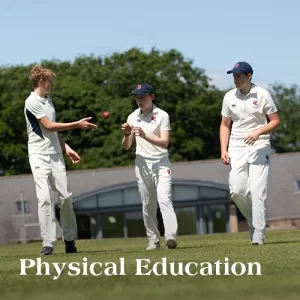 PE
PE A Level PE
Physical Education (AQA 7582)
A-level Physical Education combines applied theory with practical performance and analysis. This subject should equip students with both a depth and breadth of knowledge, understanding and skills relating to scientific, socio-cultural and practical aspects of Physical Education. We would suggest that students wishing to follow this course should be at a grade 6 or equivalent level in Biology in order to give themselves a strong chance of achieving highly in the final written examinations. Students who are performing to a high standard practically in one or more sports have the chance to earn high marks in the non-assessment area of the course.
Subject content:
- Applied anatomy and physiology
- Skill acquisition
- Sport and society
- Exercise physiology
- Biomechanical movement
- Sport psychology
- Sport and society and the role of technology in physical activity and sport
Paper 1: Factors affecting participation in physical activity and sport
What is assessed?
Section A: Applied anatomy and physiology
- multiple choice, short answer and extended writing (35 marks)
Section B: Skill acquisition
- multiple choice, short answer and extended writing (35 marks)
Section C: Sport and society
- multiple choice, short answer and extended writing (35 marks)
How it is assessed:
Written exam: 2 hours, 105 marks, 35% of A-level
Paper 2: Factors affecting optimal performance in physical activity and sport
What is assessed?
Section A: Exercise physiology and biomechanics
- multiple choice, short answer and extended writing (35 marks)
Section B: Sport psychology
- multiple choice, short answer and extended writing (35 marks)
Section C: Sport and society and technology in sport
- multiple choice, short answer and extended writing (35 marks)
How it is assessed:
Written exam: 2 hours, 105 marks, 35% of A-level
Non-exam assessment: Practical performance in physical activity and sport
What is assessed?
Students assessed as a performer or coach in the full-sided version of one activity.
Plus: written/verbal analysis of performance.
How it is assessed:
Internal assessment, external moderation
90 marks, 30% of A-level
An Advanced level qualification in PE is an essential pre-requisite for specialist study in Physical Education and Sports Studies in Higher Education, and is a suitable qualification for other areas of study such as Medicine and Psychology. The specification provides an excellent foundation for students intending to pursue careers in Teaching, Coaching, Sports Science, Sports Development, Leisure and Recreation, Health and Fitness and Professional Sport.
 Politics
Politics A Level Politics
AQA Politics has 3 components which are examined in separate papers:
Paper 1: Government and Politics of the UK (examination – 33 ⅓%)
- When studying the government of the UK students will learn about the nature and sources of the British Constitution, the structure and role of Parliament, the Prime Minister and Cabinet, the judiciary and devolution.
- When studying the politics of the UK students will learn about democracy and participation, elections and referendums, political parties, pressure groups and the European Union.
Paper 2: Government and Politics of the USA and comparative politics (examination – 33 ⅓%)
- When studying this unit students will learn about the constitutional framework of the US government, the legislative branch of government: Congress, the executive branch of government: President, the judicial branch of government, the electoral process and direct democracy, political parties, pressure groups and civil rights.
- When studying comparative politics students will analyse key similarities and differences between the UK and USA.
Paper 3: Political Ideas (examination – 33 ⅓%)
- When studying this unit students will learn about liberalism, conservatism, socialism, nationalism, feminism, multiculturalism, anarchism and ecologism.
 Psychology
Psychology Psychology
Psychology (AQA 7182)
The A-Level course aims to provide students with a thorough understanding of Psychology. This specification provides a broad and balanced content, with superb progression to higher education.
A Level Psychology
Paper 1:
Introductory topics in Psychology (33.3% weighting)
The content of this paper includes topics on social influence, memory, attachment and psychopathology. Students will be assessed in a 2-hour written exam.
Paper 2:
Psychology in context (33.3% weighting)
The content of this paper includes topics on approaches in Psychology, biopsychology and research methods. Students will be assessed in a 2-hour written exam.
Paper/Component 3:
Issues and options in Psychology (33.3% weighting)
The content of this paper includes topics on issues and debates in Psychology. Students will then study 3 options from; relationships, gender, cognition and development, schizophrenia, eating behaviour, stress, aggression, forensic and addiction. Students will be assessed in a 2-hour written exam.
Links to other subjects
There is significant crossover with other main science subjects, religious studies and P.E
Links to HE courses and beyond
Medicine, law, psychiatry, counselling, business studies, sports science, forensic psychology, health science.
Student views on the course
“This is an extremely interesting A-level subject. I didn’t know what to expect, as I had never studied Psychology before. It has opened up my understanding of how and why humans behave as they do and has taught me to appreciate the complexities of human mind.”
Year 1 trips
The Psychology department runs a one day trip to Nottingham Playhouse where they will learn about Psychology as a science from leading experts in the field of Psychology.
The Psychology department also runs a two day trip to London. This includes a visit to the Freud museum, the science museum, London zoo (including phobia hypnotherapy workshop) and a Jack the Ripper walking tour.
Year 2 trips
The Psychology department runs a one day trip to Sheffield Crown Court where students have a question and answer session with a crown court judge and then watch live court proceedings from the public gallery.
The Psychology department runs a three day trip to Poland. This includes a visit to Auschwitz, which is studied in the topic of social influence.
The Psychology department runs a Psychology film club on Thursday lunchtimes where new and old films related to the psychology specification are watched and discussed.
Mrs Downs (Head of Psychology) is an experienced examiners for AQA.
 Religious Education
Religious Education A Level Religious Studies
AQA 7062
RS A Level at Birkdale is an opportunity to study philosophy and theology in depth. Our syllabus takes us to some of the most profound questions of philosophy and ethics in our Western intellectual tradition and then considers their relationship to faith and religion. In our Christian Theology sections, students gain a significant insight into the key ideas of the Christian worldview.
If you are interested in ideas and taking them apart, in debating moral questions and in an in-depth study of Christianity, this A Level is worth considering.
Component 1: Philosophy of Religion and Ethics (50%)
Section A: Philosophy of Religion
This course begins with arguments for the existence of God. We learn about Paley’s argument by design and its modern equivalents. We go on to Anselm’s ontological argument – God exists by definition! We study the famous cosmological arguments of Aquinas. Can the universe tell us there’s a God? This is followed by a study of the problem of evil. How can belief in a benevolent God be defended in the face of evil and suffering? Hick’s ‘soul-making’ theory is one response, Griffin’s ‘process theodicy’ is another. We then look at religious experience. Could this be a source of knowledge about God? Then, religious language is analysed. What is the relationship between religious language and reality? Does it reveal truth or simply express emotion? Could miracles be real: can natural laws be broken? Finally, we study questions of life after death. What is a soul? Could humans live on after death?
Section B: Ethics and Religion
This course begins with an overview of ethical theory, understanding the difference between rule-based ethics and consequence based ethics. Issues of human life and death takes us into the territory of difficult moral dilemmas like embryo research, cloning and designer babies. We also work through questions about abortion, euthanasia and capital punishment. Issues of animal life and death looks into the morality of using animals in scientific procedures and in blood sports. In an introduction to meta-ethics, we ask fundamental questions about what ‘good’ really means, is it what God commands, or just what causes the most happiness? In free will and moral responsibility we ask that age old philosophical question, are humans genuinely free or merely socially conditioned? We’ll go on to study theories about the conscience. What is it and where is it from? Is it from God? Can it be trusted? The final section of this course compares the work of famous philosophers Bentham and Kant.
This component is assessed by one three hour exam.
Component 2: Study of Religion and Dialogues (50%)
Section A: Christianity
This course creates a thorough insight into those key concepts which build a Christian worldview. It begins with sources of wisdom and authority, understanding different approaches to the Bible, conservative and liberal. We then study the nature of God – triune, revealed in Jesus Christ. We raise further questions about death and the afterlife, studying the theological complexities of Heaven and Hell. We look at the key moral principles which form the structure of a radical Christian ethic. Then there are sections on applied theology: How should Christians make sense of issues of gender and sexuality? How can Christians respond to modern, often atheistic science? What are the challenges presented to Christians by an increasingly secularand pluralistic society?
Section B: The Dialogue between Philosophy of Religion and Christianity
Section C: The Dialogue between Ethical Studies and Christianity
To end the course, these sections present an opportunity to further develop our student’s evaluative skills by bringing together key aspects of their A Level studies. What happens when critical, philosophical studies are applied to issues of faith and belief? What happens when the Christian faith is analysed from a critical, moral perspective? And, how has Christianity contributed to moral debate?
This component is also assessed by one three hour exam.
The Value of Religious Studies
Studying Philosophy and Theology provides an outstanding education in thinking and communicating. You will learn to evaluate and argue with precision, skills your future university is looking for. In the past, students looking to go on to study Medicine, Law, Business Studies and Psychology have chosen to take RS A Level for the skills it provides. Of course, many of our students are inspired to go on to study degree courses in Philosophy or Theology.
Religious Studies complements many A Level subjects, from Physics and Maths to English, History and Art. In RS we consider fundamental questions of human nature and existence. This helps to deepen our students’ understanding of their other subjects.
There is no need to have studied GCSE RS to go on to take the A Level.
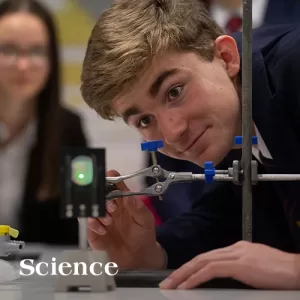 Science
Science A Level Biology
The new linear GCE specification is designed to follow on from GCSE combined sciences or from GCSE Biology as a separate science. Our objective in Biology is to develop a student’s interest in the many different fields of Biology, whilst ensuring they appreciate how biological research is carried out through knowledge of How Science Works. We also consider the ethical dilemmas often involved in the advancement of Biological diagnoses, treatment and technology. The course provides foundations for further study in biological sciences and medicine whilst developing relevant practical skills. To this end, 12 required practical tasks are assessed across the two year course to fulfil the practical skills endorsement, whilst further practical tasks support the theory work covered in class.
In addition to the course content we aim to foster a wider appreciation of the subject through pupil participation in national competitions of The Intermediate Biology Olympiad (L6 – Y12) and The British Biology Olympiad (U6 – Y13). These competitions challenge and stimulate students with an interest in Biology and aim to expand their talents. Demonstration of knowledge is rewarded with the award of medals, certificates and other prizes and it also acts as the first stage of selection in choosing a team to represent the UK in the International Biology Olympiad –a competition with participants from 60 countries.
A trip to Chester zoo in the first year of the course allows pupils to study classification in greater depth whilst handling some mammal skulls to see how evolution has changed them over time. It also allows them to see many animals from different habits up close and educates them in the crucial role that zoos have in conservation of species and maintaining biodiversity.
Links to other subjects
Biology complements the other science courses and can be combined with Mathematics and Chemistry for those wishing to pursue careers in medicine, dentistry and veterinary science. It works well with arts courses to provide scientific skills in data analysis and should therefore be undertaken by anyone with a love of the subject.
Links to HE courses and beyond
Biology at A-level can provide a stepping stone to a the wide ranging Biology University courses in diverse fields such as ecology, genetics, anatomy, environmental science, zoology and marine biology. A good grade in A-level Biology is well thought of by University admissions tutors and is useful for those pupils who wish to study medicine, dentistry and veterinary sciences. It also provides pupils with many transferable skills including data processing and high levels of literacy and numeracy.
A Level Chemistry
The GCE specification in Chemistry has been tailored to follow on from GCSE Trilogy Science or GCSE Chemistry as a separate science. It will develop a student’s knowledge and understanding whilst providing a pathway to further study in Higher Education. Our objective is to develop a student’s interest for the subject, including an interest in further study and careers in Chemistry, to appreciate how society makes decisions about scientific issues and to develop a deeper appreciation of the skills, knowledge and understanding of How Science Works. The new specification does not involve practical assessment but we are still devoted to ensuring students do develop the practical skills required to be a successful chemist.
A Level Chemistry – Assessment by three written papers:
Paper 1: 7405/1 (Written Paper 2 hours 35% A level)
This paper consists of a mixture of short and long answer questions (105 marks) and is a 2 hour paper. It accounts for 35% of the A level Chemistry qualification. Topics examined include Inorganic Chemistry with relevant Physical Chemistry and Practical Skills.
Paper 2: 7405/2 (Written Paper 2 hours 35% A level)
This paper consists of a mixture of short and long answer questions (105 marks) and is a 2 hour paper. It accounts for 35% of the A level Chemistry qualification. Topics examined include Organic Chemistry with relevant Physical Chemistry and Practical Skills.
Paper 3: 7405/3 (Written Paper 2 hours 30% A level)
This paper consists of questions on practical techniques and data analysis (40 marks) with further questions based on topics from across the specification (20 marks). There is a further multiple choice section (30 marks). This paper accounts for 30% of the A level Chemistry qualification.
Links to other subjects
Chemistry at GCE level compliments courses in Mathematics, Physics, Biology and Geography. It can also be studied simply for the love of the subject.
Links to HE courses and beyond
A good grade in Advanced Level Chemistry is well regarded by University admissions tutors and is essential for anyone wishing to study medicine at University. It is recognised that the subject still demands the ability to engage in analytical thinking as well as demanding high levels of literacy and numeracy.
A Level Physics
Course Overview
Physics is the study of how matter and energy interact. It is a fascinating subject that is interwoven with every aspect of our lives.
In the A-level course, you will learn about Physics on the grandest scale –what is the nature of the Universe and how has it evolved? You will also delve into the very smallest of scales – what are the particles that are the building blocks of the nucleus?
Physics is a practical subject, and our approach is to couple theoretical lessons with as much practical work as possible. There will also be many opportunities to engage in extra-curricular activities such as the Physics Olympiad and the chance to visit CERN in Geneva.
Paper 1 (Written Exam, 2hrs (85 marks) 34% of A level)
Paper 1 covers the following topics: Measurements and their errors, Particles and Radiation, Waves, Mechanics and Materials, Electricity, Periodic Motion.
The paper consists of 60 marks of short and long answer questions, and 25 marks of multiple choice questions.
Paper 2: (Written Exam, 2hrs (85 marks) 34% of A level)
Paper 2 covers the following topics: Thermal Physics, Fields and their Consequences, Nuclear Physics.
The paper consists of 60 marks of short and long answer questions, and 25 marks of multiple choice questions.
Paper 3: (Written Exam, 2hrs (80 marks) 32% of A level)
Paper 3 covers the following topics: Practical Skills and Data Analysis, plus one chosen from Astrophysics, Medical Physics, Engineering Physics, Turning Points in Physics, Electronics.
The paper consists of 45 marks of short and long answer questions on practical experiments and data analysis, followed by 35 marks of short and long answer questions on the optional topic.
Links to other subjects
A-level Physics has very close links to Mathematics. Although it is not necessary to study A-level Maths in order to study Physics, it is recommended. Any students not taking A-level Maths can obtain additional support at our weekly Physics clinic.
Many students also choose to combine Physics with one or both of Chemistry / Biology.
Links to HE courses and beyond
Physics is highly regarded by Universities and employers because of the transferable skills it develops in students. The Russell Group of Universities accepts Physics as part of their entry requirements for nearly all degree subjects.
Please be aware that A-level Maths is also required for entry to most Physics degree courses, and that A-level Physics is required for most Engineering courses.
Physicists go on to pursue a huge range of careers – see www.physics.org/careers for more information.

